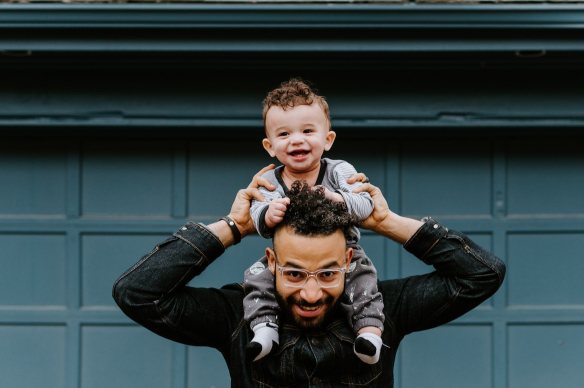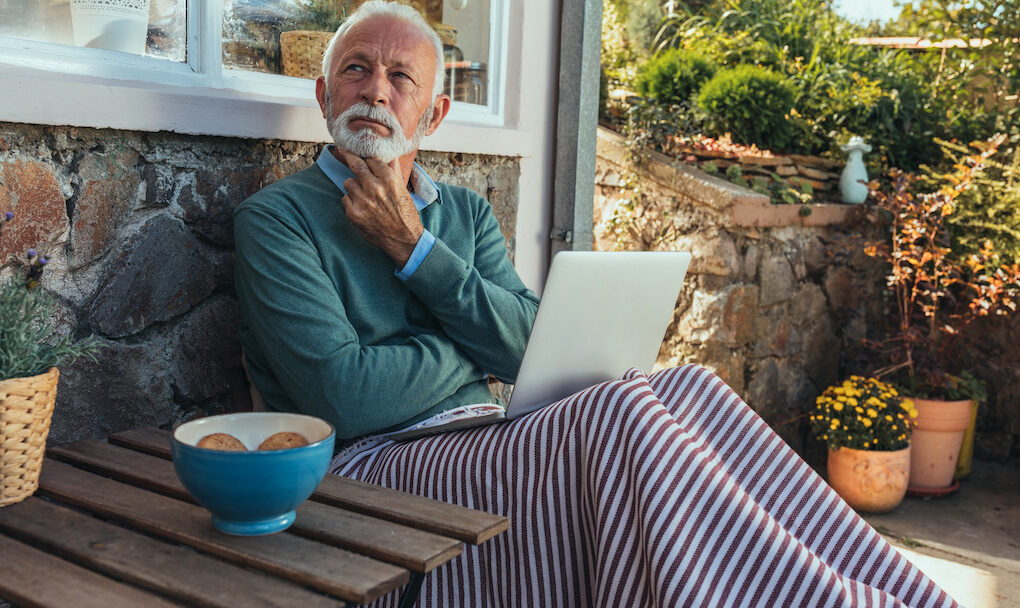Retiree Debt Relief
If you’re feeling overwhelmed with debt, saving for retirement will be that much harder. By paying off your lenders now, you can make the most of your golden years.
Retire On Your Terms
Retirement is called your golden years for a reason. You worked hard, and now it’s time to sit back and enjoy this free time. So, the last thing you need is debt casting a shadow over your plans and goals.
After working for years to financially prepare, you should be able to shift your focus to your hobbies and family without worrying about how to afford the lifestyle you want.
But as inflation has changed the economic landscape, you might be carrying debt into retirement with few solutions on how to pay it off.
Debt relief can help you pay off your debt for less than you owe and in a shorter amount of time. This guide was created to help you live the retirement you deserve.
Worrying about how you are going to make ends meets can put a damper on your retirement. Unfortunately, the odds are against you that you will be able to leave the workforce completely debt free. See if any of the reasons below resonate with you.
Debt From Insufficient Income
If you’re like most people, you’ll experience a decrease in income when you stop working. And payouts from retirement funds and Social Security aren’t keeping up with today’s cost of living. In addition, rising home prices could have you making monthly mortgage payments for much longer than you originally anticipated. Even if you set money aside, you may not have sufficient funds to cover standard living expenses for housing, food, and healthcare.
| Retirement-related debt reason | Percentage | Total |
|---|---|---|
| Adjusting to fixed income | 61% | 57 |
| Paying for Medical | 29% | 27 |
| Keeping up with inflation | 45% | 42 |
| Unexpected expenses | 53% | 49 |
| other | 3% | 3 |
CHART: Causes of debt by type
Debt From Rising Medical Costs
As we age, needing more extensive medical care and prescriptions is a fact of life. But what should you do when the costs go up at the same time your doctor visits increase? Covering chronic health conditions that require ongoing treatments could result in never-ending, but necessary, medical bills. Even if you have good health insurance, the increasing costs of medical care can result in an accumulation of debt.
Living Longer
Thanks to advanced healthcare, people are living longer than ever before. In fact, the world’s oldest person lived to be 118 years old. If you need to support yourself for 10 or 20 years more than you initially anticipated, you could outlive your savings. Retirees who choose to work past retirement age still struggle to save the full amount needed to address their longevity.
Debt From Moving Expenses
If you downsize from the family home into a smaller residence, you’ll save money on the upkeep. But the costs of moving can put a dent in your limited budget, which includes packing, moving trucks, labor, buying a new home, and more. It’s typically worth it in the end because a smaller house means lower bills and moving is a one-time expense.
Debt From Long-Term Care Costs
The costs of long-term care can be debilitating to your finances. Whether you receive care at home, in an assisted living community or in a skilled nursing facility, you could pay thousands of dollars a month for these services. And don’t forget the money needed to cover co-pays for medication, meals, physical therapy, and special medical equipment like a walker.
Higher Cost of Living
The rate at which the cost of living has been increasing lately is nothing short of shocking. Rent, housing expenses, taxes, vehicles, and the cost of food are all on the rise. As a result, managing debt in retirement has become even more challenging. Even if you socked away a decent amount of savings, it might not be enough to cover the essentials. There’s only so much you can do to simplify your lifestyle, which means these increasing costs could put you deeper into debt.
Emergency Expenses
When you’re living on a fixed income, one emergency is all it takes to put your financial situation in dire straits. Medical expenses are a common issue, but other unexpected events include car and home repairs. If a large expense takes you by surprise and you don’t have the funds, you might have to resort to taking on debt.
Maintenance Costs
Home repairs are never cheap, especially if you’re living in an older home. When the roof starts leaking or the refrigerator needs replacement, it could cost you thousands of dollars. If you don’t have an emergency fund or you didn’t account for maintenance when budgeting your retirement, you might need to take out a loan or charge the repair. Additional interest costs are the last thing you need when you’re living with debt.
61% adjusting to fixed income
29% paying for medical
45% keeping up with inflation
53% unexpected expenses
Financial Scams
Scammers are on the rise, and seniors are their favorite targets. Since many retirees aren’t savvy with technology, they are more susceptible to online data theft. This makes it all too easy for these ruthless people to steal your money with fake business opportunities, real estate flipping seminars, pretending you owe a government agency money, and more.
Most financial advisors recommend bringing as little debt as possible when moving into retirement. If that isn’t possible, there are many debt relief plans that can turn around your financial situation. National Debt Relief can help you pay off your debt through debt consolidation and debt settlement and deliver peace of mind.
Adjust Your Spending Habits
Once you’re no longer bringing in a paycheck, adjusting your spending habits can help your money go further. But it’s not always easy when you’re accustomed to a full-time income that supported travel, hobbies, and shopping, etc. Attempting to maintain your previous lifestyle on a fraction of your income won’t work. Instead, create a new budget and cut wherever possible.
Live Within Your Means
When you’re living on a fixed income, spending only what you can afford will help you avoid additional debt. If you can’t cover the credit card charge when the bill is due, you shouldn’t purchase the item unless it’s an emergency. If you hope to become debt free, it’s important not to build up more debt as you pay down what you already owe.
Delay Social Security
The age you begin collecting Social Security affects how much you get. If you start receiving retirement benefits at age 66, you’ll get 100 percent of your monthly benefit. If you delay it until after your full retirement age, your monthly benefit continues to rise. The increase is based on your date of birth and the number of months you delay receiving payments.
If you start receiving retirement benefits at age:
- 67, you’ll get 108 percent of the monthly benefit because you delayed receiving benefits for 12 months.
- 70, you’ll get 132 percent of the monthly benefit because you delayed receiving benefits for 48 months.
Downsize Where You Live
Do you really need that 4-bedroom house when the kids are on their own? If you own your home, consider selling it and moving to a smaller place. There’s a reason senior communities are so popular – they offer easy living and built-in activities. If you are lucky enough to live in an area where housing prices have risen significantly, that’s extra money you’ll have to put toward your debt and retirement savings.
Moving into an apartment, townhome, condo, or even a smaller house is a good downsizing option for retirement. You’ll enjoy the perks that come with it like fewer expenses and less maintenance. If you live in the Midwest but prefer warm weather year-round, you have the freedom to move wherever you want. You can even get more bang for your buck if you choose to buy a house in an area with a lower cost of living.
Here’s how people rated their financial management skills, according to an NDR survey:
Refinance High-Interest Credit Cards
Refinancing is used to lower the interest rate on high-interest credit cards and loans. Your options include debt consolidation, balance transfers, a personal loan, a home equity loan and borrowing from a retirement account. Qualification is determined by your credit score, credit history, debt load and finances. While this extends the length of the loan, your priority while unemployed should be building an emergency fund.
Hundreds of thousands of people have used debt relief to pay a lump sum that is less than the amount they owed.
If you choose to go this route, an expert will negotiate with creditors on your behalf. After creating a plan, you will set up affordable monthly payments to pay off the rest. These funds aren’t released without your approval. You could see your accounts resolved in as little as 24-48 month.
If you don’t have an income and saving money eludes you, you won’t qualify for debt relief. But don’t worry, there are other options to consider
Bankruptcy
Bankruptcy provides important protection if you find yourself overwhelmed with debt. While a sizable amount will be wiped out whether you file for Chapter 7 or Chapter 11 bankruptcy, it is not an easy way out. There will be a stain on your credit report for 10 years and in your personal file for eternity!
In addition, a chapter 7 bankruptcy would likely lower your credit score substantially and make it nearly impossible to qualify for new credit for 2 to 3 years. If a lender does approve you after that time for a new loan, you can expect to pay high interest since rates are based on your credit score and history.
Credit Counseling
This debt relief option simplifies your repayment process, making it easier to pay off your balances. When you contact an agency via a website or in person, a counselor will spend about an hour discussing your financial situation—often at no cost.
If your debt is substantial, the counselor may recommend a debt management plan (DMP). In this scenario, your counselor will determine how much you can pay before negotiating on your behalf with creditors. The outcome can be longer terms, lower monthly payments based on what your budget allows, or a reduction in interest rates.
If the majority of your creditors agree to your debt management plan, you would immediately stop paying them. Instead, you would send one payment each month to the credit-counseling agency. They are responsible for distributing the money per your mutual agreement.
The downside is that it typically takes five years to complete. During that time, you would be required to shelve the credit cards that aren’t in your plan and not take on any new credit until you have paid off your debt.
The benefit is that your monthly payment will be much lower than the amounts you are currently making. You may also have any penalty charges and fees waived. Best of all, you will put an end to creditors harassing you both night and day.
Self-Payment Initiative
This type of DIY debt relief provides the option for you to try to pay off your debt on your own. It’s not easy, but it can save you time and money. While you won’t be burdened with the fees that come with hiring someone, the odds of success are slim given your financial history.
To start with, you need a plan that shows how much debt you owe and your ability to pay it off. This will provide a full picture of your financial situation, which is the important first step in getting it under control. The easiest way to do this is through a spreadsheet, which you can find for free on Google Doc.
- Include the name of the creditor
- The total amount owed
- Your minimum payment (if applicable)
- Payment due dates
Some people consider the next step cringeworthy: calling creditors to demonstrate your financial hardship. Be prepared to show documentation that backs up your claims. If you can convince creditors that you are short on funds, you can then discuss the possible options that would enable you to meet your debt obligations.
There are three other possibilities you could discuss:
- Have your interest rates reduced to lower your monthly payments
- Suggest a timeout period of two to three months during which time you would take a break from making payments. This will give you breathing room to get your finances reorganized and to save money that might allow you to catch up on payments.
- Have some or all your credit cards converted into repayment programs. Please note that you would likely be required to give your cards a rest. In turn, you would have fixed payments for a set amount of time.
Debt Consolidation
When debt piles up, keeping up or catching up with your bills can become an uphill battle. Maxed out credit cards or cards with high balances need to be paid immediately, before they get completely out of hand. Retirees in this situation often turn to debt consolidation. When you take out this type of loan, you use the funds to repay your high-interest credit card debt. The balances are then consolidated into a new, single loan with lower monthly payments at a reduced interest rate. A debt consolidation loan could help you:
- Extend your repayment term
- Save money with a lower interest rate
- Lower your monthly payments
These type of loans are unsecured, which means no collateral is needed to guarantee it. Your interest rate will be based on your credit score, income, and other financial information. It is usually higher than that what you would pay for a secured loan since the lender takes on more risk when the loan isn’t backed by property like a home or car. To avoid further debt, it is essential to work with an experienced debt relief company. They can help you pay it off and shape better spending habits for retirement.
Minimum Payments vs. Debt Settlement
A credit card minimum payment is the lowest amount you can pay every month while keeping your account in good standing. By making minimum payments on your credit cards every billing cycle, you can avoid nasty late fees, penalty APR and a ding on your credit score. But it could cost you thousands of dollars in interest over a long period of time.
Debt settlement, on the other hand, can provide a financial breather and put you on the path toward rebuilding your credit. You will usually pay less than you owe and become debt free in a shorter amount of time. As you settle your debts, your credit score should start to recover. Our clients with a lower credit score coming into the program report the largest average increases in their credit by graduation.
When Should You Consider Debt Relief?
Debt relief isn’t a one-size-fits-all solution. Before going over your options, you can save yourself time by seeing if you qualify to enroll in a debt relief program.
The odds are good you would qualify if:
- You are paying just the minimums on your credit card bills or other loan payments
- 50/30/20:
You are still up to date on your bills, but you are living paycheck to paycheck - You have tried to pay down your debt on your own, but it was too difficult without support from an expert
- You have no hope of repaying your unsecured debt within five years, even if you take extreme measures to cut spending
- 50/30/20:
You are so overwhelmed that you have considered drastic measures like bankruptcy
“The first phone call to National Debt Relief was the hardest to make, but I was glad I did it. It’s one of the easiest things I’ve done”
People often perceive their job as more than just a way to make a living. It influences how we see ourselves, as well as the way others see us—especially when your passion is your career. Even if you didn’t lose your dream job, you will mourn not seeing your co-workers and the loss of your daily routine. The lack of a salary goes without saying.
Suddenly finding yourself unemployed can leave you feeling lost, angry, and depressed. It’s normal to feel anxious about what the future holds. But no matter how bleak things seem right now, this too shall pass. Searching for work can become a full-time job. And if you immediately dive into searching for a new role, you might be surprised at how much more productive you’ll feel.
Emotional and Physical Effects of Unemployment
The anxiety that accompanies unemployment and financial instability is known to affect people’s physical and mental health. In fact, long-term stress from being unemployed can lead to health problems including migraines, hypertension, diabetes, cardiovascular disease, back pain, and sleeplessness. Emotional issues include depression, illness, substance abuse, anger, and violence.
Many households rely on multiple incomes to pay bills and cover daily expenses, and the loss of that regular paycheck can take its toll. A long stretch of unemployment in a marriage can cause stress, fighting and even a breakup. Is it any wonder that money is one of the main causes of divorce?
You would think that the unemployed person could use this opportunity to chip in with household duties. But many women who bring home a paycheck also report having responsibility for household chores. This can add a lot of conflict to an already tense situation. How bad can it get? Men who are not the breadwinners in a marriage are more likely to get divorced.
Coping With The Pressure of Unemployment
Being laid off and getting fired are two very different things. Layoffs usually have nothing to do with your individual performance, it is the company as a whole that is suffering. This could be due to inflation, financial turndown, redundancy, and more. Redundancy happens when employees are no longer required for the role through no fault of their own. For instance, someone on an assembly line might be replaced by a robot.
Getting fired, on the other hand, can reflect the individual. An employee’s job is terminated against their will for reasons such as poor work performance or unethical behavior by breaking company rules. If you get fired, you can use the time to reassess your goals. Perhaps the answer is a complete career change. Sometimes the job simply wasn’t a good fit. Learn from your experience and move onto a better role.
You have every right to be mad that you lost your job. But taking out your anger on loved ones or bingeing on booze or food isn’t a healthy way to deal with your disappointment. You can turn that negativity into positive energy through exercise, catching up with friends, reassessing your goals, or even tackling a spring cleaning.
During your free consultation, a debt specialist will determine a timeline and your monthly payment amount to settle your debts. You will immediately begin depositing the money into an FDIC-insured dedicated savings account in your name. Most clients become debt free in as little as 24-48 months.
Once a debt has been settled, we will contact you for approval and ask that you release the funds. If you lack the money to settle all your debts, we offer a payment program that enables you to make just one monthly payment to National Debt Relief. As the funds build up, we use the money to pay your creditors for you.
National Debt Relief is accredited with an A+ rating by the Better Business Bureau and belongs to the American Association for Debt Resolution — the watchdog of the debt settlement business. To be a member of this Council, we have pledged to treat our clients with transparency, honesty, ethics, and fairness.
To learn more about how National Debt Relief can help you take back your life, call 800-300-9550 or complete the no-obligation debt consultation form today. We promise to support you every step of the way, just like we have done for over 500,000 people across the country.
“National Debt Relief put together a plan that I could follow and afford. If I just kept making minimum payments it would’ve taken 40 years to pay off.”

Something really exciting happens after people have their first phone call with us.
They immediately feel a sense of relief knowing they have a plan to get out of debt.
Pay off your credit card debt
- Receive A Free Savings Estimate Today
- See How Quickly You Can Be Debt Free
- No Fees Until Your Accounts Are Settled







